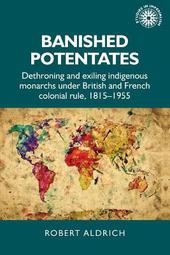
|
Banished Potentates: Dethroning and Exiling Indigenous Monarchs Under British and French Colonial Rule, 1815-1955
Paperback / softback
Main Details
| Title |
Banished Potentates: Dethroning and Exiling Indigenous Monarchs Under British and French Colonial Rule, 1815-1955
|
| Authors and Contributors |
By (author) Robert Aldrich
|
| Series | Studies in Imperialism |
|---|
| Physical Properties |
| Format:Paperback / softback | | Pages:328 | | Dimensions(mm): Height 234,Width 156 |
|
| Category/Genre | World history
Colonialism and imperialism |
|---|
| ISBN/Barcode |
9781526151667
|
| Classifications | Dewey:325.32 |
|---|
| Audience | | General | | Tertiary Education (US: College) | | Professional & Vocational | |
|---|
| Illustrations |
15 black & white illustrations
|
|
Publishing Details |
| Publisher |
Manchester University Press
|
| Imprint |
Manchester University Press
|
| Publication Date |
8 September 2020 |
| Publication Country |
United Kingdom
|
Description
Though the overthrow and exile of Napoleon in 1815 is a familiar episode in modern history, it is not well known that just a few months later, British colonisers toppled and banished the last king in Ceylon. Beginning with that case, this volume examines the deposition and exile of indigenous monarchs by the British and French - with examples in India, Burma, Malaysia, Vietnam, Madagascar, Tunisia and Morocco - from the early nineteenth century down to the eve of decolonisation. It argues that removal of native sovereigns, and sometimes abolition of dynasties, provided a powerful strategy used by colonisers, though European overlords were seldom capable of quelling resistance in the conquered countries, or of effacing the memory of local monarchies and the legacies they left behind. -- .
Author Biography
Robert Aldrich is Professor of European History at the University of Sydney -- .
Reviews'The book is particularly inspiring ... in that it takes the institution of monarchy with all its ceremonies, backgrounds, political-religious ideas, and contexts seriously, even in a time of (supposedly) anti-monarchical nationalism, colonialism, and modernity. This study shows once again how influential monarchical ideas and conventions remained after the French Revolution.' Cathleen Sarti, Royal Studies Journal 'It is always a pleasure to write a review on a book that is so easily readable and really adds to one's own knowledge in a significant manner. [...] The book is particularly inspiring-from the perspective of a pre-modern royal studies scholar-in that it takes the institution of monarchy with all its ceremonies, backgrounds, political-religious ideas, and contexts seriously, even in a time of (supposedly) anti-monarchical nationalism, colonialism, and modernity. This study shows once again how influential monarchical ideas and conventions remained after the French Revolution.' Cathleen Sarti, Royal Studies Journal -- .
|